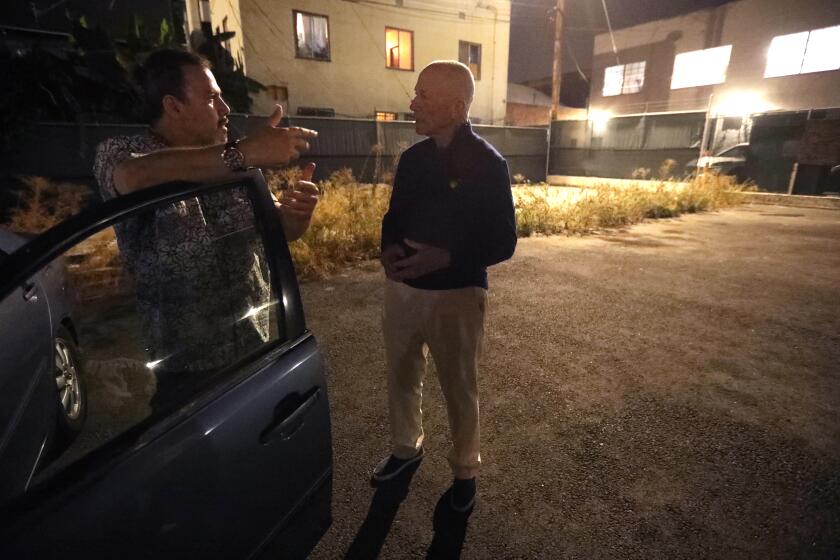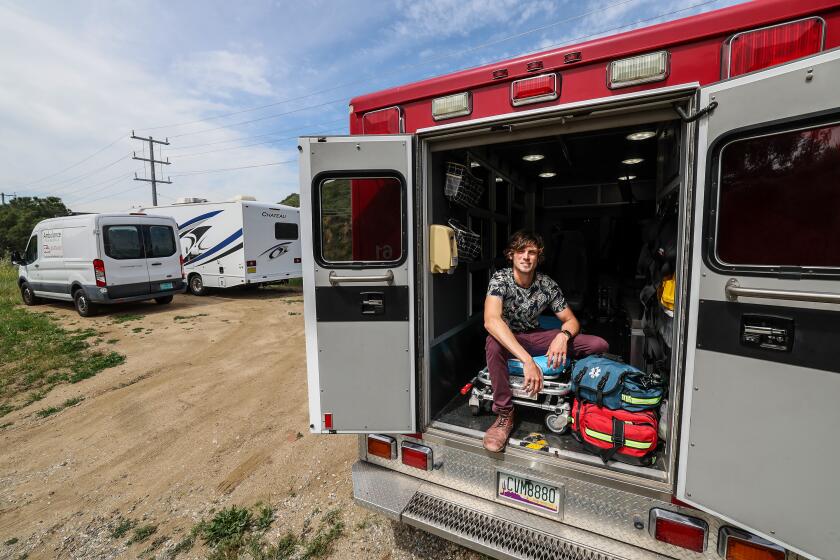At Home With the Homeless
If Les Goldberg’s wife, Phyllis, were still alive, she would tell him that he is nuts. It’s fine to help the homeless, she would say. But for a man in his 80s, a retired professional who could afford to live very nicely on his own, for such a man to invite them -- sick and lonely and straight from the river bottom -- into his home? That, she would say, is something that wouldn’t happen if she were still around.
Goldberg has gone through the dialogue in his mind many times. He sees himself listening patiently, as he did for 55 years, then saying: “Babe, I get the message. I hear you. But I’m doing it my way.”
And so he is.
For five years, Goldberg has lived with homeless men -- as many as 10 at a time -- in a Ventura compound he bought for that purpose. At first, his friends were astonished. They told him he could get robbed, beaten, killed. But they knew their warnings would ring hollow, because Goldberg, a retired engineer, is a man who wants for nothing as long as he has someone to help.
Goldberg’s philosophy is simple: Just do it. Don’t wait for the other guy. If you think it’s all up to the government, you will be disappointed forever. Opening his home is what God expects of him, he says: “If you’ve got the capacity to help and you don’t, then that’s a sin.”
At 85, he picks up and delivers enough surplus food to feed about 1,000 people a month. He is a fixture at soup kitchens and storefront churches, a well-known face to the poor and their pastors. And if he can assist some down-and-outers just by providing a roof, something to do and some sympathetic schmoozing in the living room, well, why not?
“Anyone can do it!” Goldberg said with the conviction of a TV real estate guru talking about buying houses with nothing down. “These guys are just like you and me.”
The Goldberg fraternity isn’t exactly a typical American household. Most of “the boys,” as Goldberg calls them, have been in and out of jail. All have hard-luck stories -- booze, drugs, bad families, bad marriages, bad choices, bad karma.
Located on a quiet, well-kept block in the city’s poorest neighborhood, Goldberg’s property has two small houses, an ancient trailer and a van occupied by a dog named Max, the pet of a former resident now deceased. Donated table saws, rusty bicycles, a heap of scrap wood and other odds and ends sit in a backyard bordered with rosebushes planted by “the boys.”
From time to time, Goldberg has to throw tenants out. One stole change that Goldberg collects for bottled water. Others kept getting into fights. But by and large, the men stick to Goldberg’s rules:
No drugs. No women living on the premises. Tenants with income must pay $400 a month for room and board. Others must work around the compound, at odd jobs Goldberg lines up for them or at the kinds of volunteer activities that have filled Goldberg’s life for years.
“He doesn’t try to run your life,” said Dan Studebaker, 42, a tenant for three years. “He just makes suggestions.”
When Studebaker was in trouble for missing child-support payments, Goldberg persuaded him to go to the Ventura County district attorney’s office and negotiate a lower monthly rate.
“I was so discouraged,” Studebaker said. “I was about to say the hell with it and go back to living in the bushes. But Les told me not to do that, that I’d already been there. He’s a lot more like a father to me than a landlord.”
Goldberg loaned money to Studebaker for an old pickup truck. When Studebaker and a buddy were working a carpentry job in Oxnard, an inspector told them they needed a business license. That afternoon, Goldberg took them to City Hall and loaned them $100 for a license.
Some of Goldberg’s tenants wind up back on the streets or in jail. But there have been success stories. One man found a job and an apartment as a caretaker at a condominium complex. Another made a living selling used merchandise, trading at swap meets, antique stores and pawn shops.
“When he died, they found he had $13,000 in pawn tickets,” Goldberg said.
Goldberg, an aeronautical engineer who later had his own fire-sprinkler business, has been helping homeless people for years.
“He’d go under bridges and pull guys out from their tents and cardboard boxes and say, ‘Look, you can do something that has some dignity to it,’ ” said rancher Jack Broome, a local philanthropist and longtime friend of Goldberg.
“Then he’d take them out to the fields gleaning vegetables for the poor. He gave them some reason to live.”
In 1994, Goldberg started the Breakfast Club, a weekly group for homeless men willing to help others. The next year, he bought a Ventura fixer-upper for $120,000, had it renovated by a crew of homeless handymen and leased it to the Commission on Human Concerns, a nonprofit social services agency.
Since then, it’s been home for five paying tenants who would otherwise be living on the streets. The commission still pays the original rent of $800 a month.
Goldberg’s days fill up with what he calls “little miracles.”
“Someone calls me to give away something and I remember someone who needs it,” he said. “A miracle!”
Five years ago, Goldberg sold the place he had shared with Phyllis in a Ventura mobile-home retirement community.
At that point, he started the most unusual of the Goldberg variations on altruism.
“Nobody ever opens their homes to the homeless,” said Lee Riggan, director of the Commission on Human Concerns. “Nobody.”
But Goldberg does a lot of things differently.
He plays tennis three mornings a week, despite pain from the prostate cancer that has spread into his bones.
“I can beat any 85-year-old guy around,” he said, joking.
When he walks down the street, he gives a big hello to everyone he sees, stranger or not.
“It’s something my father taught me,” he said, tearing up as he launched into recollections of his parents and growing up in Milwaukee.
“It doesn’t cost you a thing and it might make someone’s day.”
Years ago, Goldberg saw a notice in the paper about Olivet Baptist Church celebrating the payoff of its mortgage. That he was Jewish -- at one time he was the president of Temple Beth Torah -- and that the church is primarily black didn’t keep him from helping the congregation celebrate.
“I thought it was a civic duty,” he said. “I wanted to be there. I wanted to congratulate them. I thought it was great!”
Goldberg and the church’s pastor, the Rev. John Baylor, are now fast friends, joshing each other continually about the difference in their backgrounds. When Goldberg told him about his plans to take in homeless men, Baylor told him he was taking a big chance.
“But he was committed to it,” Baylor said. “That’s just Les.”




